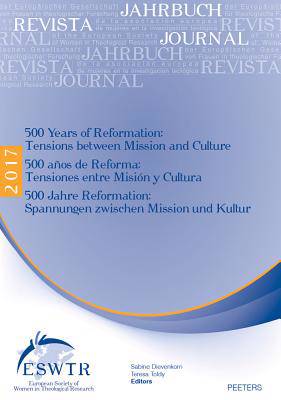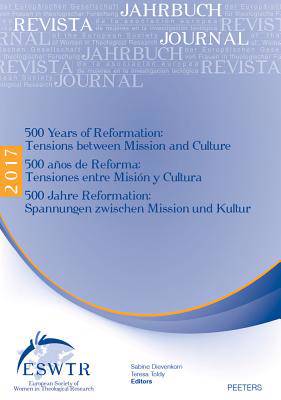
- Afhalen na 1 uur in een winkel met voorraad
- Gratis thuislevering in België vanaf € 30
- Ruim aanbod met 7 miljoen producten
- Afhalen na 1 uur in een winkel met voorraad
- Gratis thuislevering in België vanaf € 30
- Ruim aanbod met 7 miljoen producten
Zoeken
500 Years of Reformation: Tensions between Mission and Culture - 500 años de Reforma: Las tensiones entre Misión y Cultura - 500 Jahre Reformation: Spannungen zwischen Mission und Kultur
Paperback | Meerdere talen | Journal of the European Society of Women in Theological Research | nr. 25
€ 50,00
+ 100 punten
Omschrijving
The Reformation has a far-reaching missionary dimension. Martin Luther, with his translation of the Bible, had not only contributed to the transcription of the German language. He initiated a theological process of translation and transculturation of the Bible. Patriarchally-coined cultural-historical and socio-political contexts have undergone a theological evaluation and have had a great effect in the history of political mission. The woman, ambivalently seen as the witch, the whore and the saint, is reduced into a Protestant serving-body in the patriarchal reference system. In the tension between exegesis and eisegesis, the Protestant-becoming monk transferred the Bible into the everyday language of the German Middle Ages. As an agency-oriented mediator--to use current day terminology--he inscribed, in his translation, his theology of Reformation. Oscillating between author and reader, source and target text, he gave the biblical word the interpretation that he regarded as politically correct and theologically viable. The so-reformed Bible was an innovation for patriarchal European theology and science, facilitating male progress in the form of individualism and national democracies and states. Protesting Catholic women theologians and Protestant-becoming nuns had no historical opportunity. With the termination of monastic life in the Protestant Church, formal life options and education possibilities for women had become restricted. That women could raise their voices as theologians only 500 years after Reformation is due not least to the fact that the Reformation was not able to produce female evangelical theologians, nor had it wanted to, nor could it do so. This would change only with the transformation in universities' politics in the 20th century.
Specificaties
Betrokkenen
- Uitgeverij:
Inhoud
- Aantal bladzijden:
- 225
- Taal:
- Meerdere talen
- Reeks:
- Reeksnummer:
- nr. 25
Eigenschappen
- Productcode (EAN):
- 9789042935518
- Verschijningsdatum:
- 11/12/2017
- Uitvoering:
- Paperback
- Formaat:
- Trade paperback (VS)
- Afmetingen:
- 150 mm x 210 mm
- Gewicht:
- 317 g

Alleen bij Standaard Boekhandel
+ 100 punten op je klantenkaart van Standaard Boekhandel
Beoordelingen
We publiceren alleen reviews die voldoen aan de voorwaarden voor reviews. Bekijk onze voorwaarden voor reviews.










